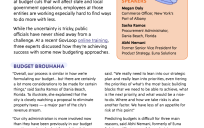 Like many of us in municipal human services, you may be looking for grant funding to supplement your budget. Some of you have to add grant writing to your job tasks because your municipality, department or agency doesn’t have a grant writer on staff. But, you can’t apply for every grant that looks promising. You need to be strategic. So, before you start another grant application, consider the following points that may help you to choose the right grant for your needs:
Like many of us in municipal human services, you may be looking for grant funding to supplement your budget. Some of you have to add grant writing to your job tasks because your municipality, department or agency doesn’t have a grant writer on staff. But, you can’t apply for every grant that looks promising. You need to be strategic. So, before you start another grant application, consider the following points that may help you to choose the right grant for your needs:
Positive Points
- The grantor is easy to work with, has a simple application, has reasonable expectations, is supportive through the process and flexible when challenges arise.
- The grantor offers training to assist you in carrying out the work of the grant.
- The funding provides needed programs and services not covered in your budget.
- It advances the goals of your municipality, department or agency.
- The funding adds resources to address a specific need or issue.
- The funding allows for capital improvements.
- It allows you to subcontract with providers or hire additional staff with expertise you don’t have.
- The grant award period is long enough for you to complete the deliverables.
Negative Points
- The grantor is difficult to work with.
- The grant award is a one-time award.
- Some grants exclude government entities from applying
- Often, grants promote the goals of the grantor which may not be your goals.
- Sometimes there is no grant funding to address the need or issue you want to address.
- Some grant applications are too complex and require preparation time you may not have.
- Sometimes the amount of the grant award isn’t worth the effort when balanced against the expectations of the grantor.
- Submitting the grant application is no guarantee you will receive the grant funding.
- Do you have a sustainability plan for the program or service when the grant funding dries up?
Subcontracting
If the grant funding allows you to subcontract with a provider, more information will be required in the application. So, here are some additional points to consider:
- You will need a contract with your subcontractor which delineates things like project deadlines, report requirements, deliverables and payment schedules.
- You will need documentation that they are financially sound; e.g. a copy of their annual audit.
- Has the subcontractor demonstrated past successes related to the grant work?
- Are you prepared to monitor them for progress on the grant work?
- Can you count on them to provide the information you need to determine progress?
- Are you prepared to delivery bad news to them if you are unable to secure additional funding?
Other Grant Information
Federal or state government agencies publish their grant announcements and will notify you electronically if you are on their listserv. Another resource is the Grants.gov website which has information on federal grants, tips for applicants, training information and more. And, private funders such as family foundations and major corporations publish their grant applications and guidelines on their own websites.
Grantors often provide technical assistance sessions when they announce grant availability. And, some require your attendance to be eligible to apply. Make sure you take advantage of those sessions. The grantor provides valuable information at those sessions that will help you to prepare your best application.
If you don’t have time to search individual agency websites, there are websites that do the work for you. Those websites research and post grant announcements from many sources, not just government grants. For example, GrantStation and Grantfinder are two that I am familiar with that announce federal, state and private foundation grants.
If you are new to grant writing, look for both on-line and in-person trainings to learn the fundamentals. And, some training focuses on writing specific types of grants — federal, state and foundation grants. It takes practice to produce great grant applications and there are no short cuts. So, don’t be discouraged when your applications are not accepted. Keep applying but start the process by choosing the right grant for your needs.
Mary Roche Cronin is a GovLoop Featured Contributor. She is the Director of Human Services for the Town of Manchester, Connecticut and has held that position since January 2005. She is responsible for management of four divisions, provides contract oversight for community agencies receiving town funding, and represents the town on community, regional and statewide human services planning and advisory groups. She also provides oversight of the department budget and state and federal grant funding. She has a Master’s degree in Child Welfare from St. Joseph College in West Hartford, Connecticut and a Juris Doctorate from Western New England College School of Law in Springfield, Massachusetts. You can read her posts here.





This is an awesome post Mary. Folks working with grants regularly should cite this frequently as a primary resource.
You can also do some market research and see what types of organizations are getting the federal grants that your office is interested in. USAspending.gov’s Advanced Search tool is a great way to execute custom queries based on your grant interests! Check it out: https://www.usaspending.gov/#/search.